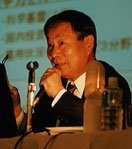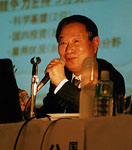Regulatory Reform and Policy Making Agents
Yoshihiro SUZUKI (Executive Advisor, NEC)
English translation of Mr. Suzuki's speech at GLOCOM's 10th anniversary forum on November 19, 2001
Japan's International Competitiveness
 Based on my experience as a member of the Council for Regulatory Reform for the government, I would like to talk about regulatory reform in Japan. First, let me point out that Japan's international competitiveness has been rapidly declining, as indicated in IMD's "World Competitive Year Book, 2001." Among the weakest are Japan's college education, governmental transparency, cabinet consensus for policy directions, etc. On the other hand, the foundations for science and technology in Japan are ranked second among 49 countries. One wonders why Japan's competitiveness is so low in spite of its relatively strong foundations for science and technology. Based on my experience as a member of the Council for Regulatory Reform for the government, I would like to talk about regulatory reform in Japan. First, let me point out that Japan's international competitiveness has been rapidly declining, as indicated in IMD's "World Competitive Year Book, 2001." Among the weakest are Japan's college education, governmental transparency, cabinet consensus for policy directions, etc. On the other hand, the foundations for science and technology in Japan are ranked second among 49 countries. One wonders why Japan's competitiveness is so low in spite of its relatively strong foundations for science and technology.
In fact, Japan's productivity is at a very low level, according to recent studies by Japan Productivity Center. One of the main reasons for this phenomenon is that while the productivity of export-oriented manufacturing industries is quite high by international standards, the productivity of Japan's domestically oriented industries, including many of the service industries, remains at a relatively low level. And those domestic industries are protected by various regulations. The problem is that even export-oriented industries, mostly electronic and electric machine-related industries, are losing their competitiveness, while regulated domestic industries are declining precipitously.
Basic Approach to Regulatory Reform
According to recent studies by the government itself, there are more than 10,000 cases of regulation in Japan. Some 40 to 50 percent of these cases are regulated by law and cannot easily be changed. This is because there are strong vested interests behind the scene. So the question is how to break up those special interest groups, and in that regard the Koizumi administration seems to be handling the matter in a different way than the previous administrations.
Our basic approach to regulatory reform is that one should act in accordance with the principle of self-responsibility and openness to the world. In the past, the government has adopted "ex-ante" regulations, trying to prevent any trouble from happening. In this case, the government has to anticipate all possible cases for regulation, leading to a large number of regulatory measures that are very difficult to change. As a result, private parties have to ask the government for permission before undertaking any new activity. That is why we still have so many cases of regulation.
Therefore, we are trying to change such "ex-ante" regulation to "ex-post" checking, based on the principle of self-responsibility. In fact, the Cabinet officially decided to adopt a basic approach towards "ex-post" checking" a few years ago. In addition, we need to reconsider regulation for the sake of consumers rather than producers, since in the past regulation has mainly been put on the supply side to protect producers and not consumers.
Main points of Deregulation
 There are several points that are taken into consideration for deregulation. First, economic regulation should not be imposed in principle, while social regulation should be kept minimal if necessary. The problem is that in reality it is not easy to distinguish between economic regulation and social regulation, and education, heath care and other low-productivity areas have been protected in the name of social regulation. There are several points that are taken into consideration for deregulation. First, economic regulation should not be imposed in principle, while social regulation should be kept minimal if necessary. The problem is that in reality it is not easy to distinguish between economic regulation and social regulation, and education, heath care and other low-productivity areas have been protected in the name of social regulation.
Second, the method of regulation must be changed from the "spec" standard to the capability standard. For example, fire extinguishers should be given permission for marketing if they satisfy a certain standard for fire extinguishing capabilities rather than their design, material or other physical specifications.
Third, we need to clarify and simplify the content of regulations and make it consistent with international standards. For instance, it used to be that a certain fire extinguishing chemical agent was prohibited in Japan, although it was approved in any other country. We should avoid such idiosyncratic regulations.
Fourth, laws should be reviewed in accordance with the IT revolution and the emergence of information society. In Japan, for example, we should be able to conduct official business without relying on papers and stamps, as in the past.
Finally, the procedures to change, abolish, or adopt regulations should be simplified and made more transparent. While there have been some laws passed to make the procedures to adopt regulations more transparent in the last few years, the general public has failed to effectively utilize the new procedures for their own benefit.
General Public as Policy Making Agents
Now it is clear that we cannot proceed just by responding to individual needs for deregulation one at a time. What we need to do is to review all the "basic laws" in all areas, such as the basic school education law and the three basic labor laws, all of which are obsolete by now. Needless to say, IT should be utilized to facilitate such review processes by overcoming divisional rigidities and local resistance.
No one can deny the importance of entrepreneurship in Japan. In order to encourage entrepreneurship, we need to cut down the number of regulations that tend to stifle new business venture activities. In this connection, it should be emphasized that the quality and service cost for public infrastructure must be improved in Japan in order to compete with other countries, especially with other Asian countries, where their infrastructure services such as port facilities have been vastly improved in recent years.
In order to proceed further, we will select several target areas that have been lagging behind for regulatory reform. Such areas include health care, welfare, labor, employment, education and other "social" sectors of the society.
In facing the huge wave of mega-competition, such as competition with China, and the IT revolution as well as the emergence of a rapidly aging society, we need to prepare for encountering the "unknown." What we need is "creative destruction," that is to redesign our old systems altogether, just as we did after the war. Administrative reform, including deregulation, should not be left in the hands of bureaucrats who are required to follow regulations, but instead should be initiated by politicians, based on public needs. At the same time, the general public themselves must realize their role and responsibility to carry out and monitor deregulation as reform agents.
| 




